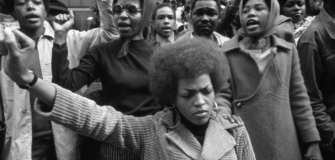Black is Beautiful
Share
We’re loving Christine Michel Carter’s article on why she’s teaching her young daughter to feel like the queen that she is. Even though your mom or grandma likely said some version of, ‘stay out of grown folks’ business,’ our little girls are watching every move we make including, how we view and celebrate our own appearance. This piece specifically urges readers to “shift the conversation from embracing inclusion to teaching pride.” Even though we might be accosted by other beauty standards on TV and magazines, embracing an ethic of self-love can have a generational impact.
“My efforts to help her think of black women as beautiful in their own right has included calculated conversations since she was four—because I know the female standard of beauty is set at a young age. I’ve tried to teach her that the world’s definition of beauty may fluctuate, but her own standard of beauty should endure.”
We’re all familiar with mainstream medias long history of disregarding Black women’s beauty. (we miss you JET Beauty of the Week!) In the 1940s, ground-breaking Black psychologists Kenneth Bancroft Clark and Mamie Phipps used dolls to study Black children’s attitudes about race. The study found that even Black children preferred to play with white dolls, largely because they were conditioned to view them as “good” and “pretty.” The study was replicated in 2005 by a film student who found that 15 of the 22 children interviewed preferred to play with a white doll over a Black doll, which is why it’s on us to to constantly remind the women and girls in our lives that they don’t need to have certain hair, hue or hip size to feel beautiful and confident.
Michel Carter’s call to action also takes us back to the 1960s “Black is Beautiful” movement, which coincided with the Black Power movement. Aside from the international symbol we now know as the black power fist, this movement embraced Blackness in all its glory including wearing naturals as an act of celebration. How can we take a nod from prior generations and celebrate ourselves today?
“I’m now focused on leading from a place of love—specifically, showing my love for the beauty of Black women. [My daughter] will be judged regardless. My job is to ensure she’s not only comfortable with the color of her skin, but also confident that her mahogany hue is absolutely stunning.”
Yes, representation matters. It absolutely impacts public perception and self-confidence, but Michel Carter wants us to push beyond representation and stresses that we need to stop body-shaming, critiquing our own appearances, and hating on our looks. She argues that it is obvious that today’s media is still living in the past and sadly, much of what’s out there doesn’t help Black girls develop confidence in their appearance. But, we can lead by example and embrace our own inner and outer Black beauty.
Check out the full story here.




Follow Us